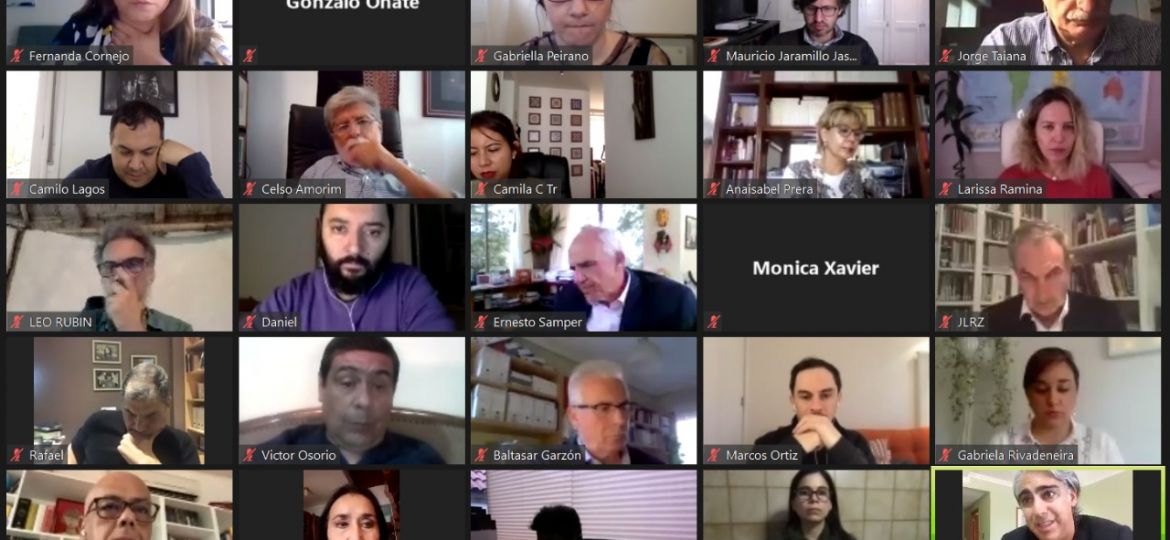
The Grupo de Puebla, an Ibero-American and Caribbean organization that has 49 leaders from 17 countries, held its fifth internal workshop in which it debated “Venezuela, election and political dialogues”, and featured outstanding presentations by José Luis Rodríguez Zapatero, former president of Spain and founder of the group; Jorge Rodríguez Gómez, former vice president of communications of the Bolivarian Republic of Venezuela and current candidate for national deputy; and Héctor Rodríguez, current governor of the Miranda State.
The event was attended by the former president of Ecuador, Rafael Correa; the former president of Paraguay, Fernando Lugo; the senator of Uruguay, Mónica Xavier; Argentine Senator Jorge Taiana; the former president of the Senate of Ecuador, Gabriela Rivadeneira; among others and other participants of the Grupo de Puebla.
On the other hand, from the Latin American Council for Justice and Democracy (CLAJUD), the jurist Carol Proner; the former judge, Baltazar Garzón, the Bolivian lawyer Jaime Quiroga and jurists such as Gissele Ricobom and the Paraguayan, Emilio Camacho, among the almost 50 attendees at the session.
At the beginning of the session, Marco Enríquez-Ominami, former Chilean presidential candidate and founder of the Grupo de Puebla, said that “in this reflection group we have agreed to meet to discuss Venezuela and its upcoming elections. A challenged democracy, a political process attacked in the midst of a pandemic, and with the United States that has recently renewed its government. Democracy is the fight for democracy, in the Grupo de Puebla we want to be a bridge and part of the conflict solution ”.
The first speaker, the governor of the Miranda State, Héctor Rodríguez, explained that “the contradiction today in Venezuela does not consist of the democratic rules of the game, but a regional geopolitical dispute fueled by the interests of the United States, for oil in Venezuela . Under this logic, the country faces a threat and an aggression without antecedents in its history ”.
For his part, the former minister and former vice president of communications of the Bolivarian Republic of Venezuela, Jorge Rodríguez, commented that “it is not the first time that the US has given orders to the Venezuelan extreme right to sabotage the electoral processes. With the election of December 6, the cycle of elections begins in Venezuela, with the election of governors in 2021, mayors in 2022 and presidential in 2024. Guarantees have been granted in all ”
“Opposition leaders have acknowledged that they fear an unfavorable outcome due to the chain of mistakes they have made since 2016 that includes violence by the guarimbas, support for sanctions, and the self-proclamation of Juan Guaidó elected with 94 thousand votes,” Rodríguez continued.
The outstanding third speaker, the former President of the Government of Spain, José Luis Rodríguez Zapatero, said that “the great paradox is that those who most criticize the elections and doubt their transparency are those who do not want the processes to be observed, supervised or accompanied elections in Venezuela. There must be a people that consolidates consensus, that banishes hatred and that democratic rules prevail. Democracy is always an effort to include, to try again and to continue trying that journey of recovery of the great values of coexistence. To all Venezuelans, participate on December 6, with the hope that whenever you go to vote, you are doing in favor of peace and the future. ”
During the day, Celso Amorim, former foreign minister and former defense minister of Brazil, was in charge of the final report, where he spoke about the need for a democratic agenda and inclusive dialogue to get out of the crisis in Venezuela.
Finally, the former president of Colombia and founder of the Grupo de Puebla, Ernesto Samper, explained that “CLAJUD, the legal arm of the Grupo de Puebla, has been studying formulas to internationally combat unilateral sanctions as an instrument, not only those reserved by some countries to impose, but rather focus on the effort on sanctions that cause humanitarian tragedies, as is the case of Venezuela or Iran, which in the midst of a pandemic are affected with sanctions of a genocidal nature ”.


